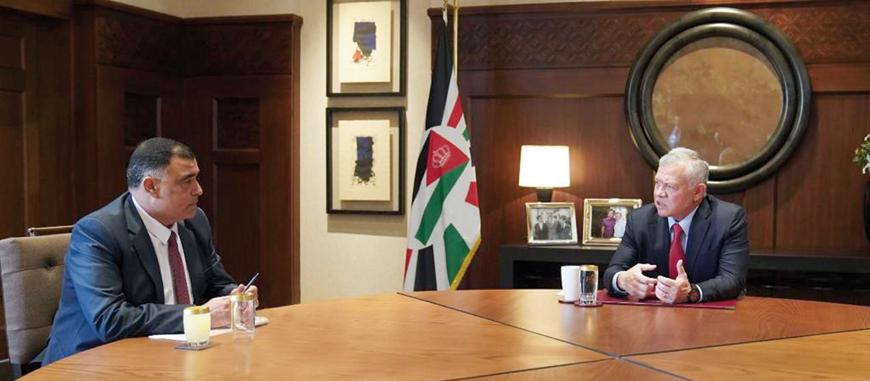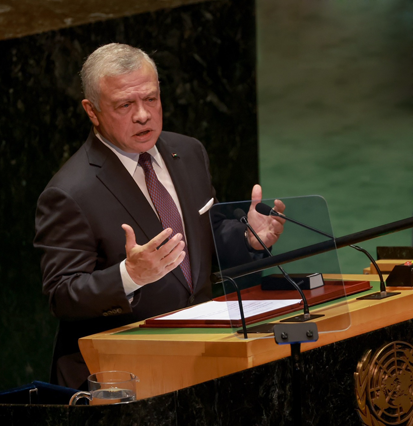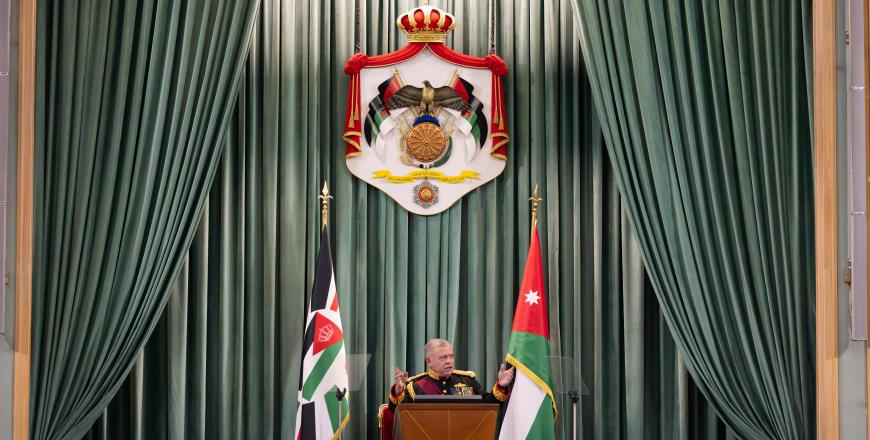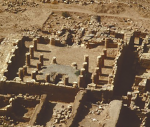You are here
King speaks to CNN’s Fareed Zakaria in wide-ranging interview
By JT - Jul 25,2021 - Last updated at Jul 26,2021

His Majesty King Abdullah speaks to CNN’s Fareed Zakaria in a wide-ranging interview (Photo courtesy of Royal Court)
AMMAN — His Majesty King Abdullah spoke to CNN’s Fareed Zakaria in a wide-ranging interview that was conducted in Washington, DC, and aired on Sunday.
In the interview, King Abdullah spoke about his recently concluded US visit, his vision on regional matters especially the Palestinian cause, prominent national issues, and Jordan’s steadfastness amidst challenges.
Following is a transcript of the interview as it was broadcast:
“Fareed Zakaria: Your Majesty, welcome.
His Majesty King Abdullah: Thank you, Fareed.
Zakaria: I have to ask you about first what seems the most startling thing looking at your part of the world, which is the new government in Israel. Prime Minister Netanyahu and you had a good relationship, but a tough one. The new prime minister, however, is somebody, Naftali Bennett, who says explicitly that he rules out the idea ever of a Palestinian state. In fact, he’s talked about Israel annexing the West Bank. So, how do you look at that new government, and where do you think the prospects for peace are?
King: Well, again, Fareed, we have known each other long enough to know that we always look at the glass half full, and coming to the United States, as the first leader from that part of the world, it was important to unify messaging, because there is a lot of challenges as you well know and we will probably get into. So, it was important for me not only to meet with the Palestinian leadership after a war, which I did, with Abu Mazen [Palestinian President Mahmoud Abbas]; I met the prime minister; I met General Gantz. We really have to get people back to the table, under that umbrella of how do we get Israelis and Palestinians to talk — maybe understanding the challenges that this government may not be the most ideal government, in my view, with the two- state solution (which is the only solution) — how can we build [understanding] between Jordan and Israel, because it has not been good, but more importantly, from my view, is getting the Israelis and Palestinians engaging again. And I came out of those meetings feeling very encouraged, and I think we have seen in the past couple of weeks, not only a better understanding between Israel and Jordan, but the voices coming out of both Israel and Palestine that we need to move forward and reset that relationship.
Zakaria: Do you think that the Israelis can maintain the situation as it is, which is with all these Palestinians in the West Bank and Gaza, Israel has sovereignty over them, but they don’t have political rights. Israel seems to feel — look, we’re doing fine, we’re, you know, we’ve become an extraordinary technological regional power, maybe global power, economically thriving, the Arabs are making peace with us, even though we haven’t moved on the Palestinian issue. Can’t Israel just keep doing what it is doing?
King: I think that’s a very fragile façade, and I say that because, again, when we have wars, there is a template there; I know what is going to happen over the three weeks and how — the loss of life and tragedy on all sides. This last war with Gaza, I thought, was different. Since 1948, this is the first time I feel that a civil war happened in Israel. When you look at the villages and the towns, Arab-Israelis and Israelis got into conflict, and I think that was a wake-up call for the people of Israel and the people of Palestine. Unless we move along, unless we give hope to the Palestinians — and again, part of the discussions that we have had with our Israeli counterparts is, how do we invest in the livelihood of the Palestinians — if they lose hope, and then, God forbid, another cycle, the next war is going to be even more damaging. Nobody ever [wins] in these conflicts, but in this last one, there were no victors. And, I think that the internal dynamics that we saw inside of Israeli towns and cities is a bit of a wake-up call for all of us.
Zakaria: Dore Gold, an influential adviser to Prime Minister Netanyahu, recently said, Jordan needs to start thinking of itself as the Palestinian state. In other words, there is a two-state solution, the Palestinian state is Jordan, I think the implication would be, of course, you have 60-70 percent Palestinians, you could absorb the Palestinians in the West Bank. This has been touted before, but here you have a fairly influential Israeli saying it. What is your reaction?
King: Well, again, that type of rhetoric is nothing new, and basically, those people have agendas that they want to do at the expense of others. Jordan is Jordan. We have a mixed society from different ethnic and religious backgrounds. I would maybe contest the percentage in the figures that you have mentioned, but it is our country. The Palestinians do not want to be in Jordan; they want their lands, they want their football team, they want their flag to fly above their houses. And so, that takes us into very dangerous rhetoric, as you alluded to. If we do not talk about the two-state solution, then, again, are we talking about a one-state solution? Is it going to be fair, transparent, and democratic? I think that the one-state solution is far more challenging to those in Israel that push that theory than the two-state solution, which is the only way. And I will go back to the beginning of the interview, that for the first time since 1948, Arab-Israelis and Israelis were having a go at each other. What are you going to do? Are you going to push all of the Palestinians out of their homes in the West Bank, and just create instability on the other side? At the end of the day, Jordan gets a vote in this. And I think our red lines have been clearly identified.
Zakaria: Your Majesty, what has it been like meeting with Joe Biden compared to his predecessor? This is a very different president from the one we had before.
King: Well, I have, fortunately, had a very strong relationship with all presidents. And that is because my father taught me that you have to respect the office of the president, the head of state, and that’s not just America. And my discussions have always been fruitful, done in mutual respect and understanding. President Biden I have known since I was a young man visiting the Congress with my father, when he was a young senator, so this is an old friendship. And I was just so delighted to see him in the White House. And I don’t know what images came out, but my colleagues that were with me could just see the chemistry there. And my son has known the president; as Joe Biden was the Vice President, my son used to go and visit him at his house and in his office, so it’s a family friendship.
Zakaria: Do you expect that you will get a different policy out of Biden than Trump?
King: Well, we have lost a couple of years, and part of it has obviously been the pandemic. And so, it is not the issue of a different policy, it is more of what are the plans that are out there. I mentioned Syria, but also when we look at Lebanon — the crisis there, the people are suffering, starvation is just around the corner, the hospitals are not working. And a lot of discussions we have had here, and I know the Americans are working with the French. When the bottom does fall out, and it will happen in weeks, what can we do as the international community to step in, knowing that whatever plans we come up with, we will fall short of our aims, and we will let people down. So I think it is, can we build plans to sort of move the region into the right direction?
Zakaria: Let me ask you about stability in Jordan itself, because your country is often seen as a kind of island of stability in a very rough neighbourhood. You have recently had what looked to the outside world like an attempted coup. What happened there and what do you see is the prospect for any instability in the future?
King: Well, again, you know, when we look at crises all over the world, and I think in this day and age, we tend to look at crises as a snapshot without really understanding the journey that actually Jordan, for example, has undertaken over the past several years — regional instability, wars, refugees, and COVID. And we have had to look at many characters that tend to use people’s frustrations and legitimate concerns of challenges that they have in making their lives better, to really push on their own agendas and ambitions. What I think made this so sad that one of the people was my brother, who did it in such an amateurish and really disappointing way. From our point, the intelligence services, as they always do, gather information, and they got to a point where they had legitimate concerns that certain individuals were trying to push my brother’s ambitions for their own agendas, and decided, quite rightly, to nip it in the bud, and quietly. If it had not been for the irresponsible manner of secretly taping conversations with officials from Jordan or leaking videos, you and I would not be having this conversation.
And I believe that I am really proud when members of our family are successful, when they can reach out to society. Now, in this particular case, if somebody has certain ambitions, I can only do so much for them, but I believe from a human point of view, it comes down to sincerity at the end of the day. It is very easy to use peoples’ grievances for personal agendas, but are you sincere in what you are trying to do for your people? And at the end of the day, we all have a responsibility to be able to come up with solutions for the people. And this is not just Jordan-centric, many royal families around the world have these challenges. If you are a member of the Royal Family, you have privileges; you need to respect those privileges, but also there are restrictions. And politics, at the end of the day, is the purview of the Monarch. And so it is just unfortunate, unnecessary, and just created problems that we could have avoided.
Zakaria: One of the people who was part of it was very close to the Crown Prince of Saudi Arabia. Do you believe there was a Saudi hand in this?
King: This is being looked at as a domestic issue. We all know that Bassem, who used to work in Jordan, is a senior adviser in Saudi Arabia. He holds Saudi and American passports. We have witnessed external relations on this issue, but, as I said, we are dealing with this as a domestic problem, and, again, knowing Jordan, finger pointing does not help at all. We have enough challenges in the region; we need to move forward. This has always been the Jordanian ethos to look to the future. And I think we are all about mitigating challenges and difficulties, as opposed to adding to them.
Zakaria: Let me ask you, this week, your grandfather was assassinated 70 years ago at the Temple Mount [Al Aqsa Mosque/Al Haram Al Sharif]. Does it feel to you as though in those 70 years, things just remained the same? Do you feel as though things have gotten better? Particularly on the issue, I mean, he was assassinated by Palestinian gunmen. It feels like things haven’t moved that far forward.
King: Well, we are celebrating our centennial, and if you look at the history of our country, with all the shocks — and most of them external — it is just amazing that Jordan is still Jordan, and that reflects, I believe, on the legacy of members of my family, but more important, I think, the steadfastness of the Jordanian people. We do live in a difficult neighbourhood, and you have got to sort of wake up every morning to look at the glass half full. The way King Abdullah looked at regional politics and trying to bring people together is what my father inherited from him, and what I inherited from my father, and my son has inherited from me. So, as difficult as the challenges are, I believe that we can come together. My great grandfather, as you said, was killed on the steps of the [Al Aqsa] mosque in Jerusalem. What we have all been about, always, is looking at Jerusalem as a city that brings Muslims, Christians, and Jews together, and it is just inconceivable to me why we would want anything else. So, my role, my son’s role will continue to be how do we make this a city of hope, a city of peace, and bringing people together, and hopefully that reflects to other policies as we deal with challenges around the Middle East.
Zakaria: Your Majesty, it is always an honour and pleasure to talk to you.
King: Thank you.”
Related Articles
AMMAN — His Majesty King Abdullah has said that political, economic and administrative modernisation must proceed in parallel to comprehensively modernise the state.
AMMAN — His Majesty King Abdullah on Tuesday participated in the 78th Session of the United Nations General Assembly, held in New York and attended by Their Royal Highnesses Crown Prince Al Hussein bin Abdullah II and Prince Hashem bin Abdullah II.
‘Our compass will always point to Palestine, with Jerusalem in its heart’ Jordan will not abandon its role in safeguarding Islamic, Chr



















